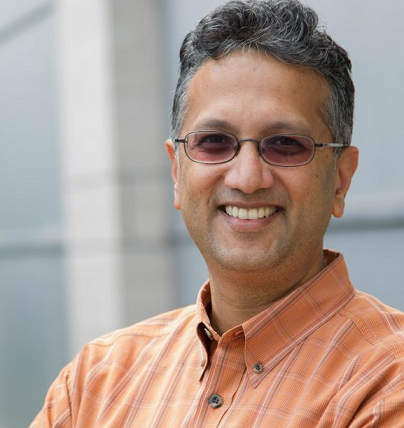- About
- Organization
- Organization Overview
- Dean’s Office
- Department of Bioengineering and Therapeutic Sciences
- Department of Clinical Pharmacy
- Department of Pharmaceutical Chemistry
- Quantitative Biosciences Institute
- Org Chart
- Research
- Education
- Patient Care
- People
- News
- Events
Wearable device monitors heart failure
By Katherine Krebs / Tue Feb 13, 2018

Susan Merrell
Shuvo Roy, PhD
A new study published in Circulation: Heart Failure shows how bioengineers are teaming up with clinicians to improve patient outcomes.
“The concept behind the device in this paper originated with a bioengineering graduate student as a side project,” says co-author Shuvo Roy, PhD. “And it subsequently led to a strong collaboration between my lab and UCSF cardiologists Drs. Liviu Klein and Teresa De Marco, illustrating nicely how bioengineers and clinicians come naturally together at UCSF to tackle significant problems in medicine.”
The research demonstrates a wearable device in the form of a patch that senses and transmits information on a patient’s cardiac condition during exercise. This kind of remote monitoring of patients with heart failure could allow clinicians to make adjustments to treatment that take into account a patient’s changing condition, and could potentially reduce hospitalizations.
The initial idea came from Mozziyar Etemadi, MD, PhD, when he was a PhD bioengineering student in the Roy Lab. Co-author J. Alex Heller, MS, was also an engineer in the Roy Lab. Roy is a faculty member in the Department of Bioengineering and Therapeutic Sciences, a joint department of the UCSF Schools of Pharmacy and Medicine.
More about this research
Tags
Keywords:
Category:
Sites:
Department of Bioengineering and Therapeutic Sciences, UCSF - UC Berkeley Joint Graduate Group in Bioengineering
About the School: The UCSF School of Pharmacy aims to solve the most pressing health care problems and strives to ensure that each patient receives the safest, most effective treatments. Our discoveries seed the development of novel therapies, and our researchers consistently lead the nation in NIH funding. The School’s doctor of pharmacy (PharmD) degree program, with its unique emphasis on scientific thinking, prepares students to be critical thinkers and leaders in their field.




